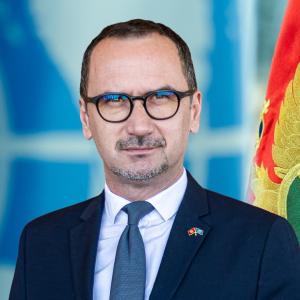Montenegro: UN expert calls for adequate social protection for older persons
30 April 2018
- Montenegro has improved its legislative framework related to social protection, but it is necessary to continue the reform to ensure integrated social and health care services for older persons.
GENEVA / PODGORICA (30 April 2018) – An independent expert appointed by the United Nations visiting Montenegro has welcomed the significant efforts of the Government, but said “older persons in Montenegro need adequate social protection”.
The number of older persons in Montenegro has tripled over the last 50 years and it is expected that by 2050 more than one in five of the population will be aged 60 or over.
“With a stagnating population, the share of older persons will increase and persist. Ensuring the full respect of the rights of older persons in the social protection system has become one of the most pressing issues”, Rosa Kornfeld-Matte, the Independent Expert on the enjoyment of all human rights by older persons, said.
Kornfeld-Matte welcomed the recently finalized strategy for the development of a new social protection system for the elderly. “The complexity of ageing requires a comprehensive approach to ensuring the enjoyment of all human rights by older persons,” the expert said.
“Montenegro has improved its legislative framework related to social protection, but it is necessary to continue the reform to ensure integrated social and health care services for older persons,” she added.
“I am concerned at the considerable percentage of older persons who still live in absolute poverty. Older persons, especially women, fall within one of the most disadvantaged groups in Montenegro; when they belong to minorities they face multiple challenges. I call on the Government to ensure that protection reaches this most vulnerable of groups,” she noted.
“I am also concerned at the high number of older persons, notably those with disabilities, who are deprived of their full legal capacity. I urge the Government to put in place a system of supported decision-making that fully respects the autonomy, integrity, dignity, will and preferences of the individual,” the expert stressed.
During her visit, Ms Kornfeld-Matte met with various representatives of Government authorities, academia and civil society as well as others working on the rights of older persons and older persons themselves.
The expert will present a comprehensive report of her findings and recommendations to the UN Human Rights Council in Geneva in September 2018.
ENDS
Ms. Rosa Kornfeld-Matte (Chile) was appointed by the Human Rights Council as the first Independent Expert on the enjoyment of all human rights by older persons in May 2014. Ms. Kornfeld-Matte served as the National Director of the Chilean National Service of Ageing where she designed and implemented the National Policy of Ageing. She has a long career as an academic and is the founder of the programme for older persons at the Pontificia Universidad Católica de Chile.
The Independent experts are part of what is known as the Special Procedures of the Human Rights Council. Special Procedures, the largest body of independent experts in the UN Human Rights system, is the general name of the Council’s independent fact-finding and monitoring mechanisms that address either specific country situations or thematic issues in all parts of the world. Special Procedures experts work on a voluntary basis; they are not UN staff and do not receive a salary for their work. They are independent from any government or organization and serve in their individual capacity.
UN Human Rights, country page - Montenegro
For further information and media requests, please contact:
Mr. Khaled Hassine (+ 41 22 917 9367 or +41(0)79 4444-5515/ khassine@ohchr.org) or write to olderpersons@ohchr.org
For media inquiries related to other UN independent experts please contact:
Jeremy Laurence, UN Human Rights – Media Unit (+41 22 917 9383 / jlaurence@ohchr.org)
This year is the 70th anniversary of the Universal Declaration of Human Rights, adopted by the UN on 10 December 1948. The Universal Declaration – translated into a world record 500 languages – is rooted in the principle that “all human beings are born free and equal in dignity and rights.” It remains relevant to everyone, every day. In honour of the 70th anniversary of this extraordinarily influential document, and to prevent its vital principles from being eroded, we are urging people everywhere to Stand Up for Human Rights: www.standup4humanrights.org.



